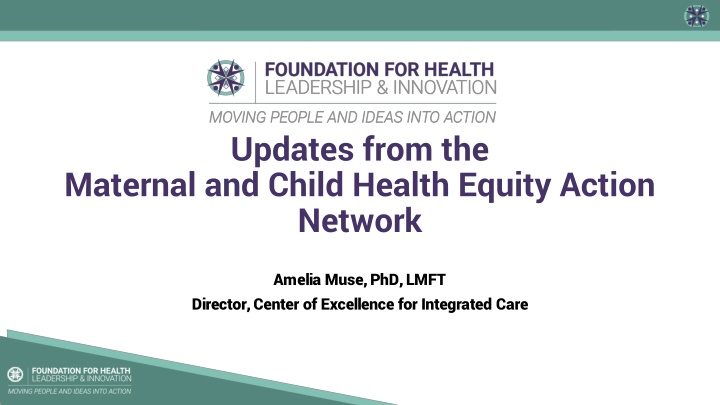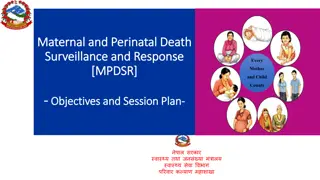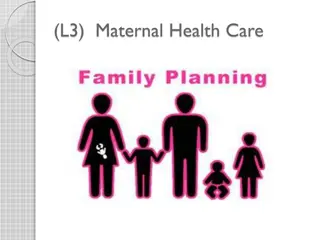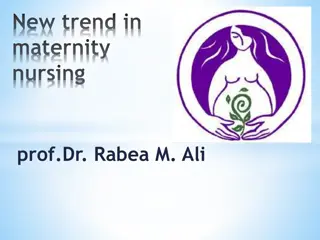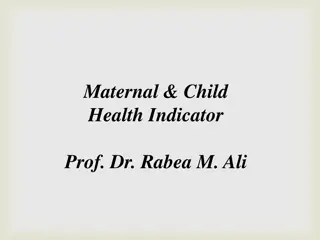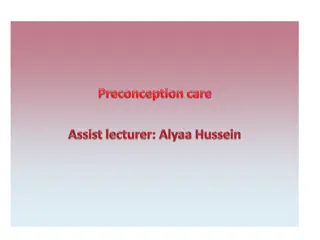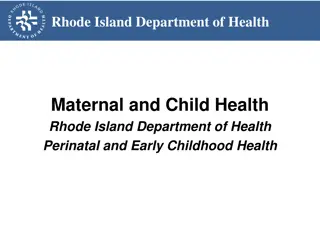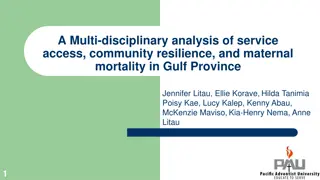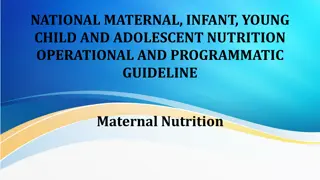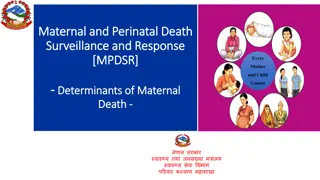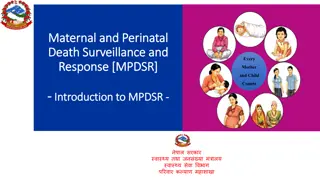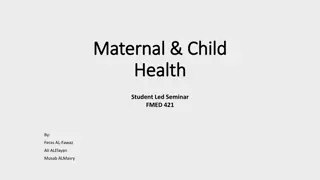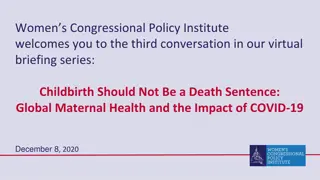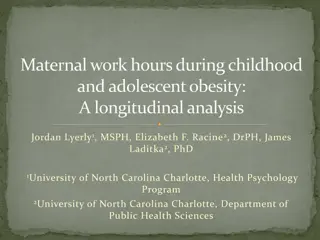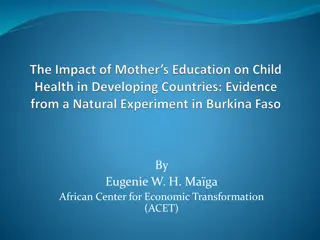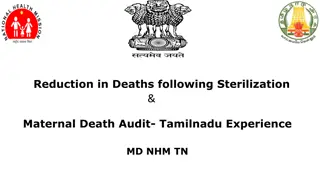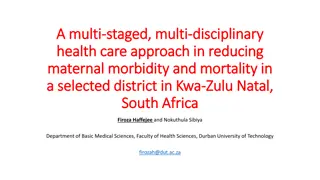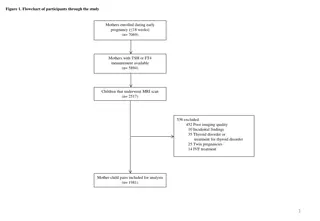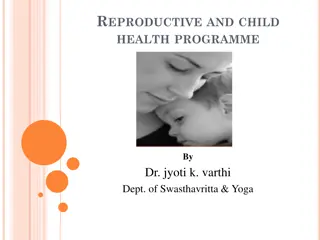Updates from Maternal and Child Health Equity Action Network by Amelia Muse, PhD, LMFT
The Maternal and Child Health Equity Action Network (MCHEAN) aims to engage key partners and communities in North Carolina to address disparities and improve maternal and child health outcomes. Through community-driven efforts, the network seeks to elevate voices, provide resources, and develop action plans for sustainable impact. Stakeholder interviews reflect a commitment to advancing maternal and child health equity, with a focus on community representation and actionable strategies for improvement.
Download Presentation

Please find below an Image/Link to download the presentation.
The content on the website is provided AS IS for your information and personal use only. It may not be sold, licensed, or shared on other websites without obtaining consent from the author.If you encounter any issues during the download, it is possible that the publisher has removed the file from their server.
You are allowed to download the files provided on this website for personal or commercial use, subject to the condition that they are used lawfully. All files are the property of their respective owners.
The content on the website is provided AS IS for your information and personal use only. It may not be sold, licensed, or shared on other websites without obtaining consent from the author.
E N D
Presentation Transcript
Updates from the Maternal and Child Health Equity Action Network Amelia Muse, PhD, LMFT Director, Center of Excellence for Integrated Care
The Maternal and Child Health Equity Action Network (MCHEAN) Goal: Engage key partners and communities who support maternal and child health equity in NC to develop a sustainable, community-driven network dedicated to strengthening maternal and child health equity outcomes and reducing disparities through action. Outcomes: Elevate community voice and provide resources to drive maternal and child health equity through the formation of an equity and action-focused Network with community representation to improve maternal and child health outcomes in NC. Improve knowledge of challenges and operationalize opportunities for maternal and child health equity in North Carolina by developing a community-informed report on the mapping and linking of maternal and child health equity efforts in North Carolina. Prime North Carolina to improve maternal and child health equity by producing and publicizing at least three action plans to achieve opportunities in partnerships, program development, and policy reform. Each action plan should be ready for implementation by the end of June 2023. Winer Family Foundation The Duke Endowment
Landscape Analysis UNC Pembroke Healthy Start CORPS UNC Pembroke racial disparities in maternal and infant health UNC Collaborative for Maternal and Child Health Safe Sleep NC North Carolina March of Dimes MAAME (Mobilizing African American Mothers through Empowerment) SistasCaring4Sistas Village Sis Doula Mothering Asheville Alliance of Black Doulas for Black Mamas Network for Public Health Law: Law and Policy Pathways to Equity in Birth Outcomes March of Dimes Nowhere to Go: Maternity Care Deserts Across The U.S. (2022 Report) NCDHHS DPH Women, Infant and Community Wellness Section Healthy North Carolina 2030 North Carolina Session Law 2018-93 NC DHHS Perinatal Health Strategic Plan (2016) NCIOM Task Forces o Perinatal Systems of Care Task Force 2020 Report: Healthy Moms, Healthy Babies: Building a Risk- Appropriate Perinatal System of Care for North Carolina o Maternal Health Task Force: 2022 Update 2022 State Health Improvement Plan 2022-2026 NC Perinatal Health Strategic Plan NC Doula Summit Perinatal Quality Collaborative of North Carolina North Carolina Perinatal Association NC Perinatal Region IV Provider Support Network NC Child Action NC
Community and Stakeholder Interviews We requested 15 interviews and completed ten interviews with 14 people working in the maternal and child health equity space, of which 70% were BIPOC. We used three questions to frame our interviews: 1) What work are you, and your team and community, doing in the state to improve maternal and child health equity?, 2) What progress has been made in our state to advance towards maternal and child health equity?, and 3) What are the opportunities that would make the most significant difference right now in improving maternal and child health equity? MAHEC Ob/GYN Provider Eastern NC Health Department Doula from Western NC Doula from Triangle Region Doula from Triad Region Nurse Mid-wife from Triangle Region Leading Maternal Health Researcher from Central NC NC March of Dimes Leader NC Maternal Health MATTERS Leader UNC/NCSU Maternal Health Equity Research Team 70% BIPOC; Additional interviews were requested.
Interview Highlights Desire for the health system to understand and value how much doulas are saving the hospital system compared to what they can be reimbursed for as a doula. Maternal and child health equity will require support for medical and non-medical support from payors. Doulas truly work for families, but funders and health partners seem to only invest in and recognize institutions, which pressures doula organizations to formalize and restricts some of the advocacy and freedom doulas need to be able to do for families. It is easy for doulas to become burned out because they invest so much emotional energy into other families while not being able to financially support their own. Concern about people in this work continuing to work in silos and duplicating efforts. Request to include the community in a participatory fashion throughout all levels of maternal and child health equity work. Women of color did not create these disparities and inequities, yet they are the ones who continue to suffer. If primarily white doula organizations set the standards for care for doula reimbursement, that would negatively impact black and brown doulas who do not have the same access to those trainings.
Themes 1. Reimbursement/sustainability of doula services. 2. Support of local health departments. 3. Support of continued transparency around data collection and evaluation.
Launching the Network Preparing the space for the community/lived experience voices December and January Establish framework and group principles Listening session and goals Guiding principles for inclusion Recruitment of community voice Contact Amelia.Muse@Foundationhli.org
